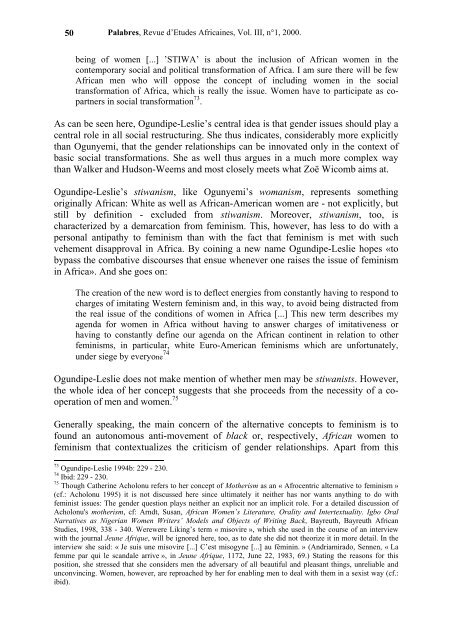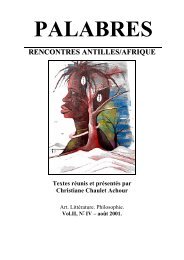Télécharger - Revue Palabres
Télécharger - Revue Palabres
Télécharger - Revue Palabres
Create successful ePaper yourself
Turn your PDF publications into a flip-book with our unique Google optimized e-Paper software.
50<br />
<strong>Palabres</strong>, <strong>Revue</strong> d’Etudes Africaines, Vol. III, n°1, 2000.<br />
being of women [...] ’STIWA’ is about the inclusion of African women in the<br />
contemporary social and political transformation of Africa. I am sure there will be few<br />
African men who will oppose the concept of including women in the social<br />
transformation of Africa, which is really the issue. Women have to participate as copartners<br />
in social transformation 73 .<br />
As can be seen here, Ogundipe-Leslie’s central idea is that gender issues should play a<br />
central role in all social restructuring. She thus indicates, considerably more explicitly<br />
than Ogunyemi, that the gender relationships can be innovated only in the context of<br />
basic social transformations. She as well thus argues in a much more complex way<br />
than Walker and Hudson-Weems and most closely meets what Zoë Wicomb aims at.<br />
Ogundipe-Leslie’s stiwanism, like Ogunyemi’s womanism, represents something<br />
originally African: White as well as African-American women are - not explicitly, but<br />
still by definition - excluded from stiwanism. Moreover, stiwanism, too, is<br />
characterized by a demarcation from feminism. This, however, has less to do with a<br />
personal antipathy to feminism than with the fact that feminism is met with such<br />
vehement disapproval in Africa. By coining a new name Ogundipe-Leslie hopes «to<br />
bypass the combative discourses that ensue whenever one raises the issue of feminism<br />
in Africa». And she goes on:<br />
The creation of the new word is to deflect energies from constantly having to respond to<br />
charges of imitating Western feminism and, in this way, to avoid being distracted from<br />
the real issue of the conditions of women in Africa [...] This new term describes my<br />
agenda for women in Africa without having to answer charges of imitativeness or<br />
having to constantly define our agenda on the African continent in relation to other<br />
feminisms, in particular, white Euro-American feminisms which are unfortunately,<br />
under siege by everyone 74<br />
Ogundipe-Leslie does not make mention of whether men may be stiwanists. However,<br />
the whole idea of her concept suggests that she proceeds from the necessity of a cooperation<br />
of men and women. 75<br />
Generally speaking, the main concern of the alternative concepts to feminism is to<br />
found an autonomous anti-movement of black or, respectively, African women to<br />
feminism that contextualizes the criticism of gender relationships. Apart from this<br />
73 Ogundipe-Leslie 1994b: 229 - 230.<br />
74 Ibid: 229 - 230.<br />
75 Though Catherine Acholonu refers to her concept of Motherism as an « Afrocentric alternative to feminism »<br />
(cf.: Acholonu 1995) it is not discussed here since ultimately it neither has nor wants anything to do with<br />
feminist issues: The gender question plays neither an explicit nor an implicit role. For a detailed discussion of<br />
Acholonu's motherism, cf: Arndt, Susan, African Women’s Literature, Orality and Intertextuality. Igbo Oral<br />
Narratives as Nigerian Women Writers’ Models and Objects of Writing Back, Bayreuth, Bayreuth African<br />
Studies, 1998, 338 - 340. Werewere Liking’s term « misovire », which she used in the course of an interview<br />
with the journal Jeune Afrique, will be ignored here, too, as to date she did not theorize it in more detail. In the<br />
interview she said: « Je suis une misovire [...] C’est misogyne [...] au féminin. » (Andriamirado, Sennen, « La<br />
femme par qui le scandale arrive », in Jeune Afrique, 1172, June 22, 1983, 69.) Stating the reasons for this<br />
position, she stressed that she considers men the adversary of all beautiful and pleasant things, unreliable and<br />
unconvincing. Women, however, are reproached by her for enabling men to deal with them in a sexist way (cf.:<br />
ibid).



